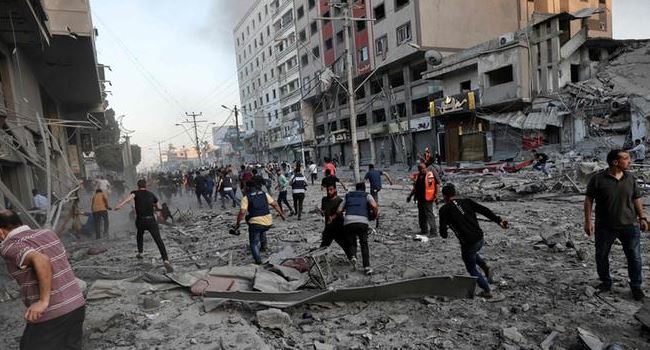International
Israel intensifies attacks in Gaza, as death toll rises above 200

More than 200 people have so far been killed in the Gaza Strip while eight have been reported dead in Israel as the bombardment of the Muslim settlement by Israeli forces enters its fifth day on Friday.
The air raids began on Monday, as the Jewish and Israeli-Arab mobs continue fighting within Israel, prompting President Benjamin Netanyahu warning of a civil war.
Israel’s Defence Minister, Benny Gantz, has also ordered a “massive reinforcement” of security forces to suppress the internal unrest that has seen more than 400 people arrested.
Police say Israeli-Arabs have been responsible for most of the trouble and reject the accusation that they are standing by while gangs of Jewish youths target Arab homes.
This week’s violence in Gaza and Israel is the worst since 2014 and was initially fuelled by weeks of Israeli-Palestinian tension in East Jerusalem which led to clashes at a holy site revered by both Muslims and Jews. This spiralled into an incessant exchange of Palestinian rocket fire and Israeli airstrikes.
The Israeli military said it had conducted an operation overnight to destroy a network of Hamas tunnels that it dubbed “the metro”, but no troops had entered Gaza, adding that over the course of Thursday evening and Friday morning, 220 more projectiles were fired from the Gaza Strip.
In a statement released early on Friday morning, Netanyahu said the Israeli military operation against Palestinian militants would continue for “as long as necessary”. He added that Hamas, the Islamist group that rules Gaza, would pay a heavy price, as would other “terrorist groups”.
On Thursday, Israel’s military called up 7,000 army reservists and deployed troops and tanks near its border with Gaza. It said a ground offensive into Gaza was one option being considered but a decision had yet to be made.
As fighting entered its fifth day, United Nations Secretary General António Guterres has called for “an immediate de-escalation and cessation of hostilities in Gaza and Israel”.
His plea echoed that of other diplomats, including Israel’s ally the US, but appeals to Israeli and Palestinian leaders have so far failed to produce a ceasefire agreement.
Read also: Israeli raids on Gaza leave 24 Palestinians, including children dead
A senior Hamas official has said the group is ready for a “reciprocal” ceasefire if the international community pressures Israel to “suppress military actions” at the disputed al-Aqsa Mosque in Jerusalem.
Rockets are seen in the night sky fired towards Israel from Beit Lahia in the northern Gaza Strip on May 14, 2021
Gaza’s Health Ministry said 27 children were among those killed since fighting began, and many other civilians have died while 600 Gazans have also been wounded.
In the Israeli town of Sderot near Gaza, a young boy was killed when rocket fire hit his home and shrapnel penetrated the shelter, he was hiding in.
The fighting between Israel and Hamas was triggered by days of escalating clashes between Palestinians and Israeli police at a holy hilltop compound in East Jerusalem.
The site is revered by both Muslims, who call it the Haram al-Sharif (Noble Sanctuary), and Jews, for whom it is known as the Temple Mount. Hamas demanded Israel remove police from there and the nearby predominantly Arab district of Sheikh Jarrah, where Palestinian families face eviction by Jewish settlers. Hamas launched rockets when its ultimatum went unheeded.
Palestinian anger had already been stoked by weeks of rising tension in East Jerusalem, inflamed by a series of confrontations with police since the start of Ramadan in mid-April.
It was further fuelled by the threatened eviction of Palestinian families from their homes in East Jerusalem by Jewish settlers and Israel’s annual celebration of its capture of East Jerusalem in the 1967 Middle East war, known as Jerusalem Day.
The fate of the city, with its deep religious and national significance to both sides, lies at the heart of the decades-old Israel-Palestinian conflict. Israel in effect annexed East Jerusalem in 1980 and considers the entire city its capital, though this is not recognised by the vast majority of other countries while Palestinians claim the eastern half of Jerusalem as the capital of a hoped-for state of their own.
By Isaac Dachen…
Join the conversation
Support Ripples Nigeria, hold up solutions journalism
Balanced, fearless journalism driven by data comes at huge financial costs.
As a media platform, we hold leadership accountable and will not trade the right to press freedom and free speech for a piece of cake.
If you like what we do, and are ready to uphold solutions journalism, kindly donate to the Ripples Nigeria cause.
Your support would help to ensure that citizens and institutions continue to have free access to credible and reliable information for societal development.
























